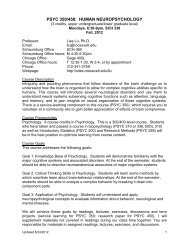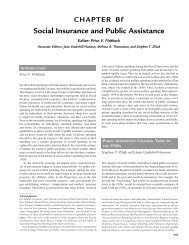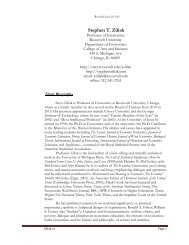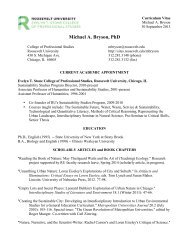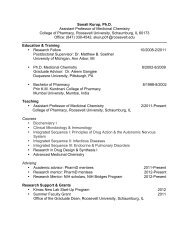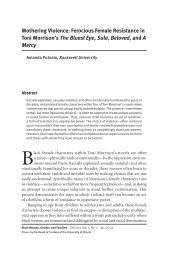Reading the Book of Nature
Reading the Book of Nature - Roosevelt University Sites
Reading the Book of Nature - Roosevelt University Sites
Create successful ePaper yourself
Turn your PDF publications into a flip-book with our unique Google optimized e-Paper software.
productions within <strong>the</strong> context <strong>of</strong> Chicago's environmental history and future sustainability; and<br />
builds upon and extends current ecocritical scholarship by syn<strong>the</strong>sizing environmental history,<br />
science and natural history, and literary studies. The larger project <strong>of</strong> which <strong>the</strong> Watts study is a<br />
part -- namely, Mapping <strong>the</strong> Urban Wilderness -- integrates what has been up to now separate<br />
areas <strong>of</strong> Chicago Studies, while at <strong>the</strong> same time pushing <strong>the</strong> work <strong>of</strong> ecocriticism in an exciting<br />
and fruitful new direction.<br />
Research Design and Analytical Methods<br />
As an interdisciplinary-minded literary critic, my research approach is unabashedly<br />
qualitative. I emphasize <strong>the</strong> close reading and analysis <strong>of</strong> individual texts, <strong>the</strong>ir relationships with<br />
one ano<strong>the</strong>r, and <strong>the</strong>ir place in <strong>the</strong> broad contexts <strong>of</strong> popular scientific discourse, nature writing,<br />
environmental history, and sustainability. I complement this textual approach by firmly<br />
grounding my analyses in <strong>the</strong> appropriate historical context and by situating my interpretations<br />
within <strong>the</strong> relevant secondary literature. My work differs from traditional literary scholarship is<br />
its focus upon non-canonical texts and authors as well as its use <strong>of</strong> insights and <strong>the</strong>ories from<br />
fields such as ecocriticism, <strong>the</strong> cultural study <strong>of</strong> science, and environmental history.<br />
In this project, I strive to bring an "ecologically critical" -- or ecocritical -- perspective to<br />
bear upon <strong>the</strong> life, literary/artistic achievements, public education efforts, and conservation work<br />
<strong>of</strong> May Watts. Ecocriticism is a specific approach within <strong>the</strong> broad area <strong>of</strong> humanistic<br />
interpretation, an environmentally-informed method <strong>of</strong> analyzing texts, artworks, and o<strong>the</strong>r<br />
cultural products. As ecocritic Cheryl Glotfelty explains in her essay, "What Is Ecocriticism?":<br />
Ecocritics and <strong>the</strong>orists ask questions like <strong>the</strong> following: How is nature<br />
represented in this sonnet? What role does <strong>the</strong> physical setting play in <strong>the</strong> plot <strong>of</strong><br />
this novel? Are <strong>the</strong> values expressed in this play consistent with ecological<br />
wisdom? How do our metaphors <strong>of</strong> <strong>the</strong> land influence <strong>the</strong> way we treat it? How<br />
14



